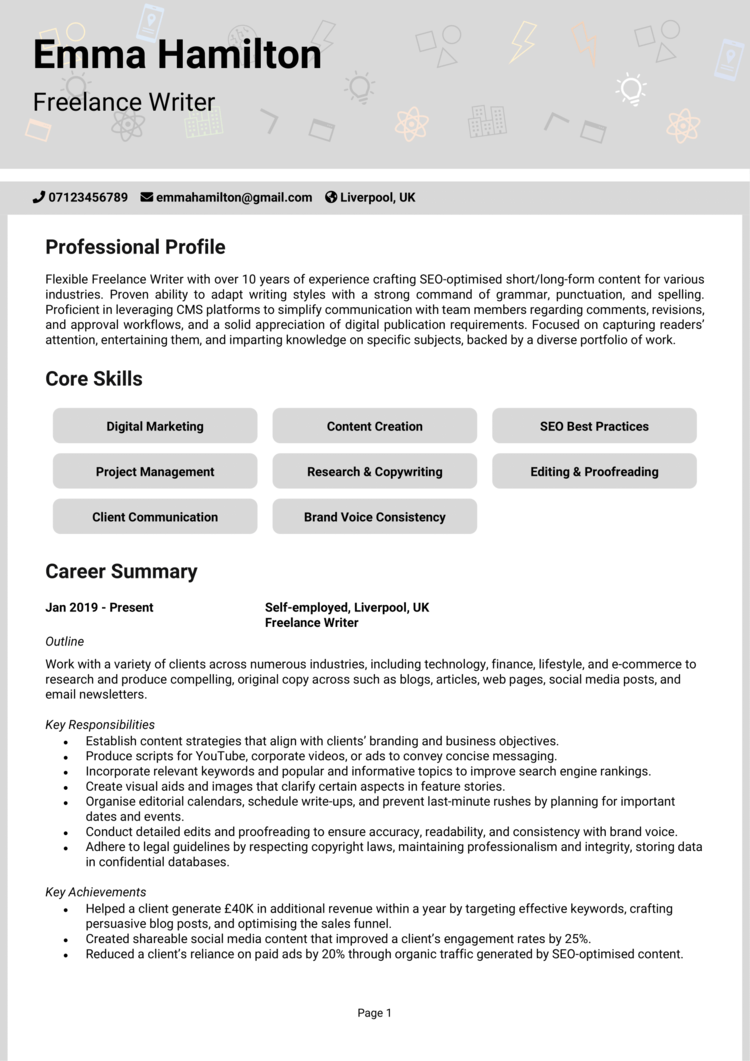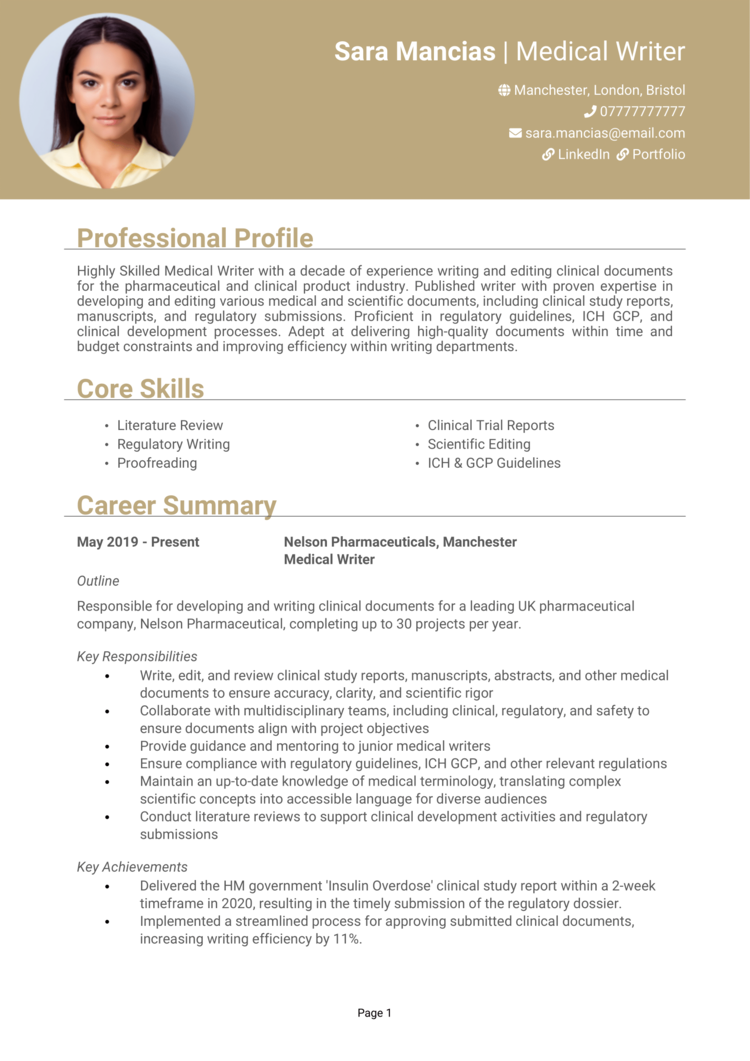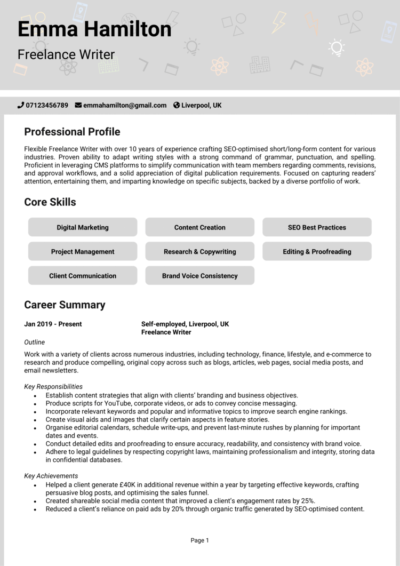Do you have the power to turn a boring brief into a masterpiece of words? Or to make readers hang onto every sentence, even about tax law?
As a Freelance Writer, your words can sell products, tell stories, or even settle Twitter debates. But before you start crafting award-winning content, you’ll need a CV that’s worth its weight in word count.
This guide, with 2 Freelance Writer CV examples, will help you create an application that highlights your expertise, versatility, and knack for bringing ideas to life through words. That way, you’ll get the attention of a diverse range of clients, ready to take you on for high-profile writing jobs.
Freelance Writer CV

Medical Writer CV

How to write your Freelance Writer CV
Learn how to create your own interview-winning Freelance Writer CV with this simple step-by-step guide.
Writing a CV as a Freelance Writer might feel like writing about yourself in the third person, but it’s an essential step to landing new gigs. Clients want to know you can deliver high-quality work on time, every time, and that you’ve got the skills to adapt your writing to suit any audience.
This guide will show you how to write a CV that’s clear, compelling, and tailored to highlight your best writing work and achievements.
Freelance Writer CV structure


Think of your CV like a perfect headline – clear, memorable, and impossible to ignore (and please, definitely no typos). A messy CV is like a first draft – it might have potential, but nobody wants to wade through it: let potential clients easily see your expertise.
Here’s how to structure your Freelance Writer CV:
- Name and contact details – Make personal details prominent at the top so clients and recruiters can connect with you easily. Adding a photo is completely up to you.
- Profile – Introduce yourself with a punchy overview that showcases your niche expertise and writing accomplishments.
- Core skills – Give a snapshot of your most valuable abilities, like SEO optimisation, copywriting, or research-driven content creation.
- Work experience – Tell the story of your professional journey, starting with the most recent gigs and projects. Focus on the impact your writing had.
- Education – Whether it’s a degree in journalism or a certificate in creative writing, mention the qualifications that underline your talent.
- Additional info – Mention hobbies and interests that reflect your creativity, such as blogging or storytelling. This section is always optional, but can be valuable.
Freelance Writer CV format


Your CV’s format should be as polished as the copy you produce for clients. Even the best writers can be overlooked if their CV isn’t easy to read or visually appealing – don’t let avoidable mistakes overshadow your talent.
Here’s how to format your Freelance Writer CV:
- Bullet points – Break information into snappy, impactful points that are easy to skim through.
- Divide sections – Use bold headings and consistent spacing to make your CV easy on the eye and even easier to navigate for recruiters or clients.
- Use a clean font – Stick to something sharp and professional – your words are the focus, not a quirky font or layout.
- Keep it the right length – No more than 2 pages, ensuring your highlights are front and centre while avoiding unnecessary fluff.
Freelance Writer CV profile


Your profile is your CV’s opening line – make it engaging enough that recruiters won’t want to stop reading. For a Freelance Writer, this is where you convey your versatility and ability to deliver quality content under tight deadlines.
Freelance Writer CV profile examples
Profile 1
Creative Freelance Writer with five years of experience producing engaging content for blogs, websites, and social media. Skilled in SEO optimisation, content strategy, and adapting tone to diverse audiences. Proficient in tools like WordPress, Grammarly, and SEMrush.
Profile 2
Versatile Freelance Writer with three years of experience crafting articles, whitepapers, and case studies for B2B clients. Adept at conducting research, meeting deadlines, and tailoring content to align with brand messaging. Experienced in using Trello and Google Docs for project management and collaboration.
Profile 3
Dedicated Freelance Writer with over eight years of expertise in ghostwriting, technical writing, and creative storytelling. Proficient in editing, proofreading, and delivering polished content that exceeds client expectations. Skilled in tools like Scrivener, MS Word, and Canva for efficient content production.
What to include in your Freelance Writer CV profile
Here are some tips on what to include in your Freelance Writer CV profile:
- Where you’ve worked – Mention notable clients, publications, or industries you’ve written for.
- Your top qualifications – Highlight degrees in writing, communications, or certifications in copywriting or SEO.
- Key skills – Include abilities like creating engaging content, meeting deadlines, or adapting to various tones.
- Writing genres – Reference specialisations such as technical writing, creative copywriting, or blog content.
- Client results – Highlight outcomes like increased web traffic, successful campaigns, or high engagement rates.
How to present your core skills section properly


Your core skills section is like a contents page for your talents – it tells recruiters exactly what to expect without making them read the whole novel.
For Freelance Writers, this section should focus on technical skills, content expertise, and writing-related tools. Tailor it to the specific niche or industry you’re targeting.
Most valuable skills for your Freelance Writer CV
- SEO Writing – Crafting content optimised for search engines to improve online visibility.
- Content Strategy – Developing plans to align content with client objectives and target audiences.
- Copywriting – Creating persuasive and engaging content for marketing and advertising.
- Editing and Proofreading – Polishing content to ensure clarity, consistency, and error-free delivery.
- Technical Writing – Simplifying complex topics for manuals, reports, and documentation.
- Creative Writing – Producing imaginative content, such as short stories, scripts, or branded narratives.
- Research – Conducting thorough research to ensure accuracy and depth in all written pieces.
- Social Media Content Creation – Crafting posts and captions tailored for engagement across platforms.
- CMS Proficiency – Managing content using platforms like WordPress or Drupal.
- Analytics and Metrics – Evaluating content performance to refine strategies and meet goals.
Describing your work experience


Your work experience section is where you demonstrate the value of your writing. Highlight your contributions to client projects, the range of work you’ve delivered, and the impact you’ve had.
List your projects or clients in reverse chronological order, focusing on measurable results and key contributions.
If you’re new to the game, highlight any freelance gigs, internships, or the time you ghostwrote your friend’s best man speech (it still counts).
The best way to structure job entries on your CV

- Outline – Provide an overview of the client, project, or industry, and your role within it.
- Responsibilities – Highlight tasks like writing, editing, or developing content strategies. Use action verbs like “created,” “developed,” or “delivered.”
- Achievements – Showcase measurable results, such as increased engagement, higher traffic, or successful campaigns. Include figures wherever possible to add impact.
Example jobs for Freelance Writer
Freelance Writer | Content Spark Agency
Outline
Produced high-quality blog posts and website content for a diverse range of clients, focusing on SEO optimisation and audience engagement. Delivered content that aligned with client goals and brand voice.
Responsibilities
- Researched industry trends to create relevant and engaging blog posts.
- Developed SEO-optimised articles using keywords to improve search rankings.
- Collaborated with clients to refine content strategy and meet business objectives.
- Edited and proofread content to ensure clarity, accuracy, and alignment with guidelines.
- Maintained a consistent publishing schedule to meet client deadlines.
Achievements
- Increased organic traffic for clients by 35 percent through targeted SEO content.
- Delivered 50+ blog posts in six months, all receiving positive client feedback.
- Achieved a 98 percent on-time delivery rate across all projects.
Freelance Writer | Elite B2B Content
Outline
Specialised in creating whitepapers, case studies, and reports for B2B companies, focusing on establishing authority and generating leads. Conducted detailed research to produce fact-based, persuasive content.
Responsibilities
- Developed whitepapers and case studies that highlighted client expertise and solutions.
- Conducted interviews with subject matter experts to gather insights for content.
- Presented data-driven reports with clear visuals and actionable recommendations.
- Managed multiple projects simultaneously, ensuring consistent quality and timeliness.
- Adapted tone and style to suit the needs of diverse industries, including technology and finance.
Achievements
- Generated 200+ qualified leads for a client through an impactful whitepaper campaign.
- Improved content approval rates by 20 percent with a refined review process.
- Recognised for delivering a case study that won an industry content marketing award.
Freelance Writer | Self-employed
Outline
Delivered a variety of freelance writing projects, including ghostwriting, technical manuals, and creative storytelling. Built strong relationships with clients by consistently exceeding expectations.
Responsibilities
- Ghostwrote articles and e-books on diverse topics, ensuring seamless alignment with client voices.
- Created user-friendly technical manuals and guides for software and hardware products.
- Wrote compelling short stories and scripts for creative projects.
- Edited and proofread existing content to improve readability and impact.
- Used tools like Canva and Adobe Spark to design visually appealing content layouts.
Achievements
- Completed a 50,000-word e-book project within six weeks, earning glowing client reviews.
- Reduced client revision requests by 30 percent through precise adherence to briefs.
- Secured repeat business with 90 percent of clients due to high-quality deliverables.
Structuring your education section


The education section is essential for Freelance Writers, as it demonstrates your foundational skills and professional training. It’s like the prologue to your career – it sets the scene but doesn’t need to drag on, so keep it brief but impactful..
Include degrees, certifications, and any relevant courses. List your qualifications in reverse chronological order, starting with the most recent.
Best qualifications for Freelance Writers
- Bachelor’s Degree in English, Journalism, or Communications – Foundational skills in writing and communication.
- Certificate in Copywriting – Expertise in crafting persuasive and engaging copy for clients.
- SEO Certification – Training in creating optimised content to improve online visibility.
- Content Marketing Certification – Proficiency in developing and executing effective content strategies.
- Technical Writing Certificate – Skills in simplifying complex concepts for clear, concise documentation.
Portfolio
As a Freelance Writer, your portfolio is your ultimate proof of talent – it’s where potential clients or employers can see your words in action.
Include a link to your online portfolio at the end of your CV, showcasing a variety of work that demonstrates your versatility and expertise. Highlight pieces tailored to the type of writing your client is looking for, whether it’s technical documentation or engaging blog posts.
Ensure your portfolio is:
- Organised and easy to navigate – Categorise your work by type or industry to help clients find relevant examples quickly.
- Tailored to the client or job – Emphasise projects that align with the type of work you’re applying for.
- Updated and polished – Keep your most recent and best work front and centre.
Your portfolio is the final step in convincing potential clients or employers that you’re the writer they’ve been looking for. Make sure it’s as engaging as the content you create!





